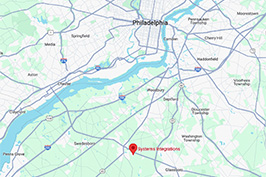FTC Safeguards Rule 2025: How Small Businesses Can Achieve Compliance Through Electronic Security Systems
Small businesses across America are facing a critical compliance deadline that many don’t even know exists. The Federal Trade Commission’s updated Safeguards Rule now applies to thousands of small businesses that handle consumer financial information, and the penalties for non-compliance can be devastating—up to $43,792 per violation.
If your small business processes customer payments, handles employee financial data, or manages any form of consumer financial information, you may be subject to the FTC Safeguards Rule. The good news? Electronic security systems aren’t just recommended for compliance—they’re often essential components that can make the difference between meeting requirements and facing costly violations.
Which Small Businesses Must Comply?
The FTC Safeguards Rule applies to any business that qualifies as a “financial institution” under the Gramm-Leach-Bliley Act. This includes many small businesses that don’t traditionally think of themselves as financial institutions:
- Car dealerships that arrange financing
- Buy-here-pay-here lots
- Auto repair shops offering payment plans
- Tax preparation services
- Accounting firms
- Financial advisors and consultants
- Real estate professionals handling earnest money
- Businesses offering layaway or payment plans
- Companies processing recurring payments
- Retailers with store credit programs
- Service providers with financing options
- Apartment complexes and rental companies
- Property management firms handling tenant payments
- Real estate investment companies
The rule applies regardless of business size—a single-person tax preparation service has the same compliance obligations as a large corporation.
What the 2025 Safeguards Rule Requires
Small businesses subject to the rule must implement a comprehensive information security program that includes:
- Designate a qualified individual to oversee the information security program
- Conduct annual risk assessments
- Create written information security policies
- Provide cybersecurity awareness training for employees
- Implement access controls to limit who can access customer information
- Use multi-factor authentication for accessing customer data
- Encrypt customer information both at rest and in transit
- Monitor and log access to customer information systems
- Secure physical access to systems and equipment containing customer information
- Protect against environmental hazards and unauthorized intrusion
- Maintain secure disposal procedures for customer information
How Electronic Security Systems Support Small Business Compliance
Card Access Control: Essential Physical Protection
For small businesses, card access control systems provide multiple compliance benefits:
- Restrict access to offices where customer files are stored
- Control entry to server rooms or areas with computer systems
- Limit access to filing cabinets containing financial documents
- Track exactly who accessed sensitive areas and when
- Create automatic logs for compliance documentation
- Provide evidence of proper access control during audits
- Instantly revoke access when employees leave
- Quickly change access permissions as roles change
- Enable emergency lockdown procedures if needed
Cost-Effective Implementation
Modern card access systems are more affordable than ever, with cloud-based solutions that don’t require expensive on-site servers. For a small accounting firm or auto dealership, a basic system can cost less than $2,000 while providing comprehensive access control.
Video Surveillance: Continuous Monitoring Made Simple
NDAA-compliant video surveillance systems help small businesses meet monitoring requirements:
- Monitor sensitive areas even when staff isn’t present
- Provide visual evidence of security measure effectiveness
- Enable remote monitoring for business owners
- Record any unauthorized access attempts
- Provide evidence for incident response reporting
- Support insurance claims if breaches occur
- Connect with access control systems for comprehensive security
- Trigger alerts when unusual activity occurs
- Provide backup verification of access logs
Intrusion Detection: Immediate Threat Response
Professional intrusion detection systems offer small businesses:
- Notify owners and security services immediately when breaches occur
- Trigger automatic lockdown procedures
- Enable rapid response to contain potential incidents
- Connect with certified monitoring services for 24/7 oversight
- Ensure immediate response even during off-hours
- Provide professional incident documentation
Cost Considerations for Small Businesses
- Basic card access control: $1,500-$3,000
- NDAA-compliant surveillance system: $2,000-$5,000
- Professional monitoring services: $30-$60 per month
- Avoid FTC fines up to $43,792 per violation
- Reduce insurance premiums through improved security
- Protect against costly data breaches
- Demonstrate professionalism to customers and partners
Financing Options:
Common Small Business Compliance Mistakes
Assuming You’re Too Small to Be Covered
The FTC Safeguards Rule applies regardless of business size. A single-person tax preparation service has the same obligations as a large corporation.
Focusing Only on Cybersecurity
Physical security is equally important. Customer information stored in filing cabinets or accessible through unsecured workstations creates compliance vulnerabilities.
Using Consumer-Grade Equipment
Home security systems don’t meet business compliance requirements. Professional-grade, NDAA-compliant equipment is essential for regulatory compliance.
Neglecting Documentation
The FTC requires comprehensive documentation of your security measures. Proper electronic security systems provide the audit trails and documentation needed for compliance.
Working with Qualified Security Professionals
Small businesses need partners who understand both security technology and regulatory compliance:
- Proper state licensing for security system installation
- Cybersecurity certification and expertise
- Experience with FTC Safeguards Rule compliance
- Understanding of small business operational needs
- Compliance risk assessments
- Professional system design and installation
- Comprehensive documentation for audit purposes
- Ongoing support and maintenance
The Compliance Deadline Reality
The FTC Safeguards Rule is already in effect, and enforcement is increasing. Small businesses that haven’t addressed compliance are operating at significant risk. Recent FTC actions show the Commission is actively pursuing violations, regardless of business size.
- Determine if your business is subject to the rule
- Conduct a basic security assessment
- Identify the most critical vulnerabilities
- Begin implementing electronic security measures
- Document all security improvements
Your Path to Compliance
FTC Safeguards Rule compliance doesn’t have to be overwhelming for small businesses. Electronic security systems provide practical, cost-effective solutions that address multiple compliance requirements while improving overall business security.




